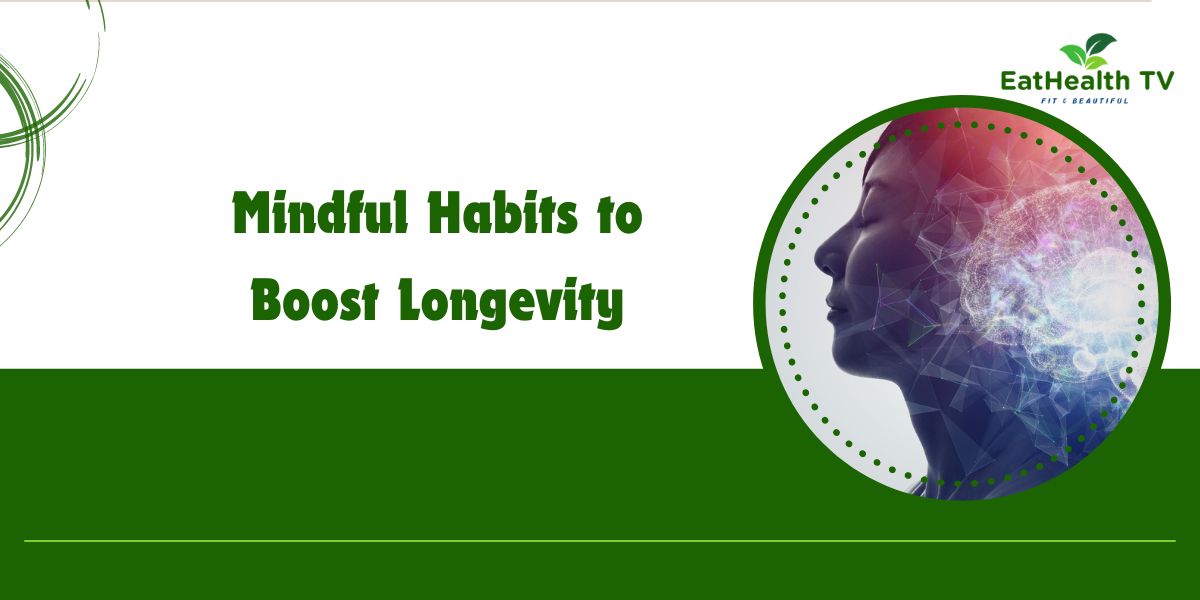Mindful Habits to Boost Longevity
Unlock a Longer, Healthier Life: Powerful Mindful Habits to Boost Longevity

Mindful Habits to Boost Longevity
In today’s fast-paced world, many people are striving for longevity—a long and healthy life. While genetic factors do play a role, a significant portion of longevity depends on lifestyle choices. Mindful habits, which encourage awareness and intentional living, can help improve physical, mental, and emotional well-being, boosting the potential for a longer, more fulfilling life. This article explores several mindful habits that have been proven to promote longevity, based on scientific studies and practices from cultures around the world known for their high life expectancies.
1. Prioritize Quality Sleep
Sleep is one of the most essential components for a healthy life. The quality and quantity of sleep directly impact your overall health, mental clarity, and emotional stability. Research has shown that consistently getting between 7 and 9 hours of sleep each night can help reduce the risk of chronic illnesses such as heart disease, obesity, and diabetes, all of which can impact longevity.
How to Practice Mindful Sleep:
- Create a Sleep Routine: Develop a consistent sleep schedule by going to bed and waking up at the same time each day.
- Limit Screen Time: Avoid blue light exposure from phones or laptops at least an hour before bedtime, as it can interfere with your body’s natural sleep cycle.
- Mindful Breathing: Incorporate deep breathing exercises or meditation before bed to calm the mind and prepare for restful sleep.
2. Eat a Balanced, Nutrient-Dense Diet
The old saying “You are what you eat” holds true when it comes to longevity. A diet rich in fruits, vegetables, whole grains, and lean proteins provides the essential nutrients your body needs to function at its best. Eating mindfully not only ensures that you consume the right nutrients but also promotes a healthy relationship with food.
Mindful Eating Tips:
- Chew Slowly: Take the time to chew and savor your food, helping your body digest more efficiently.
- Focus on Whole Foods: Choose minimally processed foods like fresh fruits, vegetables, and whole grains.
- Portion Control: Listen to your body’s hunger signals and eat until you feel satisfied, not overly full.
- Hydration: Drink plenty of water throughout the day to support your body’s natural processes and improve skin, digestion, and brain function.
3. Engage in Regular Physical Activity
Exercise is one of the most effective ways to boost longevity. Regular physical activity can help prevent diseases such as heart disease, type 2 diabetes, and certain cancers, while also improving mood and mental health. Studies suggest that even moderate exercise, like walking or yoga, can extend life expectancy.
Mindful Movement Techniques:
- Yoga and Tai Chi: Both of these practices combine physical movement with mindfulness and breathing exercises, offering a holistic approach to health and well-being.
- Take Breaks from Sitting: Make it a habit to stand, stretch, or take a short walk every hour, especially if you have a sedentary job.
- Engage in Enjoyable Activities: Whether it’s dancing, cycling, swimming, or gardening, find a form of physical activity you enjoy and make it a regular part of your routine.
4. Foster Strong Social Connections
Humans are inherently social creatures, and strong social connections are key to a long, healthy life. Studies have shown that people with close friendships and a strong support system tend to live longer and experience better mental health. Loneliness, on the other hand, can have a detrimental impact on both physical and mental health.
Mindful Social Habits:
- Spend Quality Time: Engage in meaningful conversations and activities with friends and family members.
- Join a Community: Participate in social or volunteer groups that align with your interests to foster new connections.
- Practice Active Listening: When interacting with others, focus on being present and attentive, which helps deepen relationships.
5. Manage Stress Effectively
Chronic stress can shorten your lifespan by contributing to a variety of health problems, including high blood pressure, heart disease, and a weakened immune system. Developing mindful stress management techniques can reduce the impact of stress on your body and promote a sense of calm and well-being.
Techniques for Mindful Stress Management:
- Meditation: Spend a few minutes each day practicing mindfulness or meditation to clear your mind and reduce anxiety.
- Deep Breathing: Practice deep, controlled breathing exercises to calm your nervous system and lower stress levels.
- Journaling: Writing down your thoughts and emotions can help you process and release stress, leading to better mental clarity.
6. Maintain Mental Sharpness
Keeping your brain active is essential for maintaining cognitive function as you age. Studies have shown that people who engage in regular mental stimulation are less likely to develop conditions like dementia or Alzheimer’s. Mindful mental exercises, such as puzzles, reading, or learning new skills, can help keep your mind sharp.
Mindful Mental Stimulation:
- Lifelong Learning: Continue learning new things, whether through reading, taking courses, or learning a new language or instrument.
- Mind Games: Engage in activities that challenge your brain, such as puzzles, Sudoku, or chess.
- Limit Multitasking: Focus on one task at a time, which allows for better concentration and mental efficiency.
7. Cultivate a Positive Mindset
A positive attitude can have a profound effect on your longevity. Research has shown that optimistic individuals tend to live longer and have a reduced risk of chronic illnesses. Positive thinking helps reduce stress, improves immune function, and promotes a sense of well-being.
Mindful Practices for Positivity:
- Gratitude Journaling: Write down three things you are grateful for each day. This helps shift your focus to the positive aspects of life.
- Affirmations: Practice repeating positive affirmations to boost your self-esteem and outlook on life.
- Mindfulness Meditation: Focus on the present moment through meditation to reduce anxiety about the future and regrets about the past.
8. Practice Purposeful Living
Having a sense of purpose can add years to your life. Studies from regions known as “Blue Zones,” where people often live to be over 100 years old, show that having a reason to wake up each day is a key factor in longevity. Whether it’s through career, hobbies, volunteering, or family, living with purpose gives life meaning and drives happiness.
How to Cultivate Purpose:
- Set Goals: Define both short-term and long-term goals that align with your passions and interests.
- Engage in Meaningful Work: Whether through your job or personal projects, focus on activities that give you a sense of fulfillment.
- Give Back: Volunteering and helping others can provide a strong sense of purpose and connection to your community.
9. Reduce Exposure to Harmful Habits
Certain lifestyle choices, such as smoking, excessive alcohol consumption, and poor dietary habits, can significantly reduce life expectancy. Being mindful of your daily habits and eliminating or reducing those that harm your body is crucial for longevity.
Mindful Avoidance:
- Quit Smoking: Seek help to quit smoking and avoid environments where secondhand smoke is prevalent.
- Limit Alcohol Intake: Consume alcohol in moderation, sticking to recommended guidelines to avoid health risks.
- Avoid Processed Foods: Minimize consumption of processed and junk food, opting instead for fresh, whole ingredients.
Conclusion
Longevity is not just about living longer but also about living well. By incorporating mindful habits into your daily life—whether through sleep, diet, exercise, or social connections—you can improve your overall health and well-being, increasing your chances of a long, fulfilling life. Mindfulness is about being present and intentional, allowing you to make healthier choices and reduce stress. These mindful habits, when practiced consistently, can have a profound impact on both the quality and length of your life.




